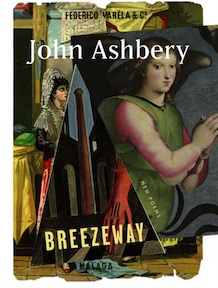By Krista Shaw
On May twelfth John Ashbery, aged eighty-seven, released his most recent collection of poems, Breezeway (Ecco, 2015). This volume is the twenty-sixth original book of poetry that Ashbery has published in an award-winning career spanning more than half a century.
Though Ashbery is now respected as one of the most innovative and influential poets of modern times, he spent his youth taking classes at the Rochester Memorial Art Gallery to train for a career in painting. A man of many interests, Ashbery worked as an art critic, a playwright, and a translator throughout his career.
After obtaining his undergraduate degree from Harvard University and his MA at Columbia University, Ashbery published his first volume of poetry, Some Trees (1956). Acclaimed poet, W. H. Auden, whom Ashbery counts as a chief literary influences according to a New York Times interview, named the volume as the winner of the Yale Younger Poets Prize. Despite this positive critical reception, the book did not immediately spawn the literary success that Ashbery was later to experience, and he was forced to look elsewhere for a source of income. Admitting in an interview with Peter Stitt for The Paris Review, “I needed some bread at the time,” Ashbery revisited the visual arts, becoming an art critic for ARTnews magazine and receiving five dollars for each article that they printed.
While Ashbery viewed art criticism as a means of making ends meet rather than as a primary interest, his poetry continued to reveal the influence of visual art. Published in 1976, Ashbery’s breakout volume, Self-Portrait in a Convex Mirror, reflected on Parmigianino’s painting by the same title. It won the 1976 Pulitzer Prize as well as the National Book Award and the National Book Critics Circle Award, thus solidifying Ashbery’s poetic career.
Ashbery’s complex and illusive poetic style reveals influences of the Mannerist, Cubist, and Abstract Expressionist art movements. In the Journal of Modern Literature, Clark D. Lunberry contends that Ashbery writes about the visible in such a way that his words strive to take on a tangible nature and create a sort of painting to render the scene. Lunberry notes how, in Ashbery’s poetry, “the poet’s applied language is stretched and strained, pushed and pulled towards its own vibrantly infused materiality.”
Not only do Ashbery’s poems attempt to embody physical reality, but also they try to capture the patterns of human thought and conversation by following fluid streams of consciousness, which nonetheless admit distractions and the interruptions of a polyphony of voices expressing numerous perspectives.
Ashbery’s style is distinctly his own, and it can prove surprising to readers because of its willful disregard for traditional form and meter and familiar tone. Even so, the inspiration for his writing, according to his interview with Stitt, stems from “the pathos and liveliness of ordinary human communication.” Ashbery’s thought is evoked by normal conversations and everyday perceptions of the world. His poetry, though not familiar or readily intelligible, seeks to express and mirror the real and ordinary experiences of the present day.
John Ashbury was named Harvard’s Phi Beta Kappa Poet and was inducted as an honorary member in 1979. He also served as the judge for the 2001 Phi Beta Kappa Poetry Award, sponsored by Phi Beta Kappa and the Library of Congress.
Krista Shaw is a senior at the University of Dallas majoring in English. The University of Dallas is home to the Eta of Texas Chapter of Phi Beta Kappa.




